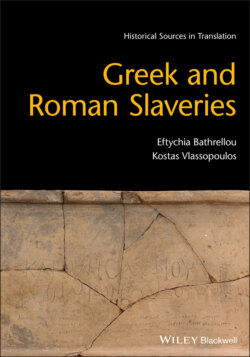Читать книгу Greek and Roman Slaveries - Eftychia Bathrellou - Страница 13
1.2 Digest, 1.5.3–4: Collection of Latin Juristic Texts (Sixth Century CE)
ОглавлениеThe Digest is a collection of excerpts from the works of republican and early imperial Roman jurists made during the reign of the emperor Justinian in the sixth century ce.
Literature: Lambertini 1984; Cavallini 1994; Garnsey 1996: 23–34; Welwei 2000; Lenski 2016.
Gaius, Institutes, Book 1: Certainly, the most important division in the law of persons is the following: all men are either free or slave.
Florentinus, Institutes, Book 9: Freedom is one’s natural ability to do what one pleases unless this is prevented by force or by law. Slavery is an institution of the law of nations12 whereby a person is subjected against nature to the ownership (dominium) of another. Slaves (servi) are thus named because commanders tend to sell captives, and thus to preserve them, rather than kill them. They are, indeed, said to be mancipia because they are captured from the enemy by force (manus).
What is freedom according to these passages?
What is the cause of slavery?
What conception of slavery underlies these passages? How does it relate to the view expressed in 1.1?
